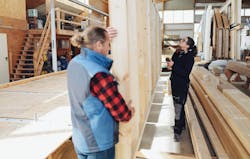How the CEO of This Housing Technology Firm Is Driving Innovation in U.S. Home Building
Immigrant entrepreneurs are responsible for 319 of 582, or 55%, of America’s startup companies valued at $1 billion or more, according to a recent report from the National Foundation for American Policy, and Veev CEO Amit Haller is no exception. Haller, an immigrant from Israel, started the housing technology firm in 2008 to automate the home building process in a more cost-effective way.
Veev takes a vertically-integrated approach to produce full-clad panelized wall systems equipped with mechanical, electrical and plumbing (MEP), which are delivered onsite and installed using the company’s plug & play system. In the end, Veev creates high-quality, turnkey homes at a fraction of traditional construction time and at a portion of the cost, Forbes reports.
Two key observations came to light. First is the bottleneck created by collaboration (or lack thereof) among various subcontractors. The construction process was hectic and fragmented and was a major source of delays and inconsistency, with a great lack of quality control. We realized that the process needed to be streamlined and rebuilt from the top down to improve quality, cost and efficiency. Second was the utter lack of innovation – large or small. We started looking for new solutions for different areas, from framing and infrastructure to finishes to home automation. From our experience, we set out to reinvent the homebuilding process completely, leading us to cofound Veev together in 2008.
